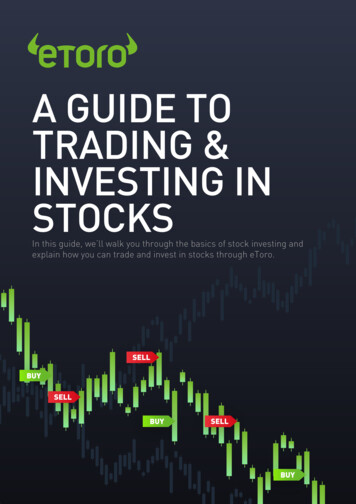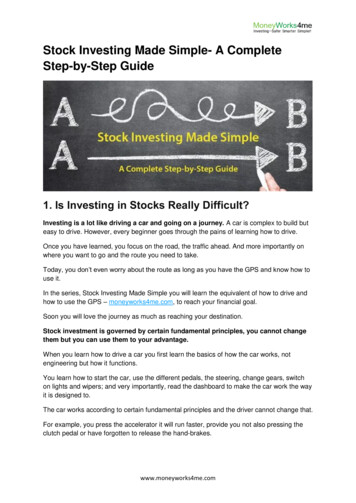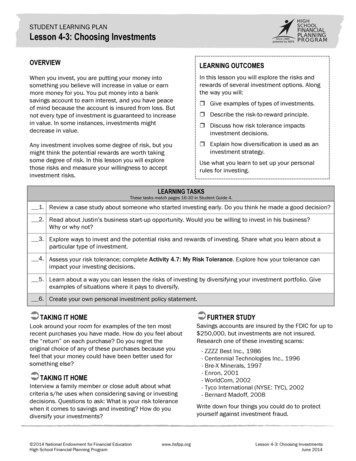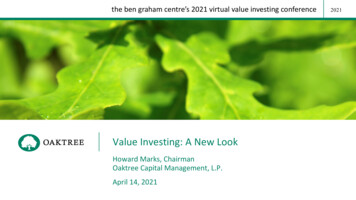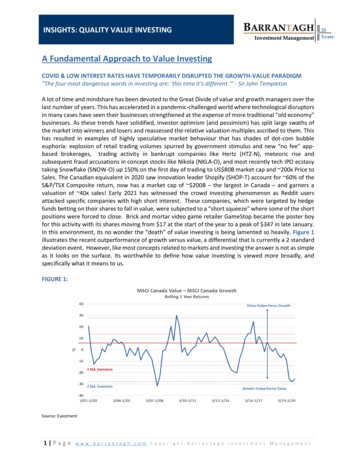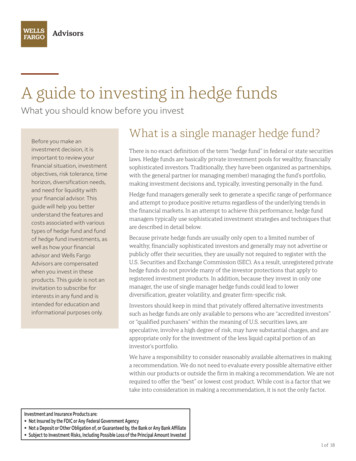
Transcription
A guide to investing in hedge fundsWhat you should know before you investBefore you make aninvestment decision, it isimportant to review yourfinancial situation, investmentobjectives, risk tolerance, timehorizon, diversification needs,and need for liquidity withyour financial advisor. Thisguide will help you betterunderstand the features andcosts associated with varioustypes of hedge fund and fundof hedge fund investments, aswell as how your financialadvisor and Wells FargoAdvisors are compensatedwhen you invest in theseproducts. This guide is not aninvitation to subscribe forinterests in any fund and isintended for education andinformational purposes only.What is a single manager hedge fund?There is no exact definition of the term “hedge fund” in federal or state securitieslaws. Hedge funds are basically private investment pools for wealthy, financiallysophisticated investors. Traditionally, they have been organized as partnerships,with the general partner (or managing member) managing the fund’s portfolio,making investment decisions and, typically, investing personally in the fund.Hedge fund managers generally seek to generate a specific range of performanceand attempt to produce positive returns regardless of the underlying trends inthe financial markets. In an attempt to achieve this performance, hedge fundmanagers typically use sophisticated investment strategies and techniques thatare described in detail below.Because private hedge funds are usually only open to a limited number ofwealthy, financially sophisticated investors and generally may not advertise orpublicly offer their securities, they are usually not required to register with theU.S. Securities and Exchange Commission (SEC). As a result, unregistered privatehedge funds do not provide many of the investor protections that apply toregistered investment products. In addition, because they invest in only onemanager, the use of single manager hedge funds could lead to lowerdiversification, greater volatility, and greater firm-specific risk.Investors should keep in mind that privately offered alternative investmentssuch as hedge funds are only available to persons who are “accredited investors”or “qualified purchasers” within the meaning of U.S. securities laws, arespeculative, involve a high degree of risk, may have substantial charges, and areappropriate only for the investment of the less liquid capital portion of aninvestor’s portfolio.We have a responsibility to consider reasonably available alternatives in makinga recommendation. We do not need to evaluate every possible alternative eitherwithin our products or outside the firm in making a recommendation. We are notrequired to offer the “best” or lowest cost product. While cost is a factor that wetake into consideration in making a recommendation, it is not the only factor.Investment and Insurance Products are: Not Insured by the FDIC or Any Federal Government Agency Not a Deposit or Other Obligation of, or Guaranteed by, the Bank or Any Bank Affiliate Subject to Investment Risks, Including Possible Loss of the Principal Amount Invested1 of 18
You should consider factors such as those below prior to accepting arecommendation: The potential risks, rewards, and costs in purchasing and in the future selling ofa security. Your age, other investments, financial situation and needs, tax status,investment objectives, investment experience, investment time horizon,liquidity needs, and risk tolerance. The security’s investment objectives, characteristics (including any special orunusual features), liquidity, volatility, and likely performance in a variety ofmarket and economic conditions. For complex products, you should consider whether less complex or costlyproducts achieve the same objectives.By accepting a recommendation, you acknowledge that you have considered theabove factors to your satisfaction.What is a fund of hedge funds?Funds of hedge funds, also known as “funds of funds,” are investment vehicleswhose portfolios invest in several underlying hedge funds to provide investorsaccess to different fund managers and their investment strategies. Unlike theunderlying private hedge fund, in which a fund of hedge funds invests, the hedgefund of funds can register with the SEC under the Investment Company Act of1940. In addition, the fund of funds’ securities also can be registered for sale tothe public under the Securities Act of 1933. Registered funds of funds can havelower minimum investments than private hedge funds (some as low as 25,000).A registered fund of hedge funds can be offered to an unlimited number ofinvestors. However, there is no investor right of redemption — shares cannot beredeemed directly with the fund unless the fund offers to redeem them, nor arethe shares usually listed on a securities exchange. With very limited exceptions,there is no “secondary market” (a market where investors purchase securitiesfrom other investors rather than from the issuers) available, so you won’t be ableto sell your investment readily. Although funds of hedge funds have been madeavailable to more investors due to the lower minimum investments, it is importantto note that these investment vehicles are not appropriate for all investors.An investment in a fund of hedge funds does have some potential advantagesover a direct investment in a private hedge fund. For example, a fund of fundsmay diversify between a number of different investment styles, strategies andhedge fund managers, in an effort to more effectively manage risk.What are concentrated hedge funds?Concentrated hedge funds are a type of fund of hedge funds with a very limitednumber of underlying managers, generally less than five. Concentrated hedgefunds provide investors with the “feel” of a single manager strategy with aslightly more diversified approach. These funds can be used to employ a coresatellite strategy when combined with fund of fund offerings that are diversifiedamong a larger number of managers.2 of 18
Core strategies provide exposure to the general market through investments intraditional asset classes such as stocks and bonds. Satellite strategies are potentiallyalpha generating and use active management to seek to deliver higher returnsthrough investments in real estate, commodities, emerging markets, currencies,high yield fixed income, and other investments that typically are uncorrelated totraditional asset classes.What is an offshore hedge fund?Hedge funds not organized under U.S. law and domiciled outside the UnitedStates are designated as “offshore hedge funds.” These funds are not registeredwith the SEC and, like other offshore products, offshore hedge funds cannotgenerally be sold to U.S. residents or offered to any persons while they are in theUnited States. Please note, however, that in certain, limited circumstances,offshore funds may be purchased by people or entities that qualify as “U.S.tax-exempt entities or persons” under the U.S. Internal Revenue Code. Taxexempt entities or persons are urged to consult their tax advisors about theirability to invest in an offshore fund and any potential tax consequences that mayresult. Additionally, not all funds are authorized for sale in all countries. Offshorehedge funds may be structured as an individual fund or a fund of funds andgenerally involve similar risks, trading strategies, and characteristics as theirdomestic counterparts.Offshore hedge funds are not subject to U.S. income taxes on distributionsreceived from the fund or to U.S. estate taxes on fund shares. Generally, offshorehedge funds are exempt from withholding taxes as well, because the funds arelocated outside the United States. Because of the nature of the U.S. tax andsecurities laws, non-U.S. investors may not want to invest in hedge funds thatare based in the United States if offshore hedge funds are available to them.What are interval funds?An interval fund is a registered and typically publicly offered closed-end fundthat, unlike a traditional closed-end fund, is continuously offered, and dependingon the fund, allows purchase through subscription on a daily, or monthly basis,but does not trade on an exchange. As there is no secondary market for intervalfunds, the fund company is required to make periodic repurchase offers for apercentage of their shares outstanding at a price based net asset value (NAV) asdefined by the fund’s prospectus. The fund may also impose a repurchase fee ofup to 2% to cover expenses. As such if in-between repurchase offers, or arepurchase offer is oversubscribed, interval funds should be considered an illiquidinvestment. Many of the investment strategies used in hedge funds and funds ofhedge funds, and therefore the risks associated with those strategies, are also presentin certain interval funds offered through Wells Fargo Advisors. Your financial advisorwill help you determine which type of investment best aligns with your objectives.3 of 18
What are cryptocurrency funds?A cryptocurrency is a digital or virtual currency that is secured by cryptography,which makes it nearly impossible to counterfeit or double-spend. Transactionsare documented and authenticated through the blockchain network via a processcalled mining. The blockchain network provides history of all transactions on adecentralized ledger that is publicly available 24/7. Mining is a process ofvalidating new transactions on the blockchain or creating new blocks. In the caseof the Bitcoin blockchain, new blocks are added once a miner’s computernetwork solves a mathematical problem which is called proof of work. This addssecurity to the Bitcoin blockchain as each new added block is permanent andcannot be changed.Bitcoin and cryptocurrencies are part of the broader blockchain basedtechnologies that are experiencing adoption across diverse segments, includingindividual investors, institutions, corporations, and central banks. Bitcoin has aunique role in this growing adoption as the oldest viable crypto token launchedin 2009. It has a fixed quantity of 21 million, and, by 2140, all bitcoin will havebeen created.Managers will typically create cryptocurrency funds to buy and sellcryptocurrency to generate returns, or create an allocation of cryptocurrency totheir existing portfolios.The timing and assurance of the SEC’s approval of a cryptocurrency ETF in theU.S. is still unknown, and the fragmented market may still pose a challenge totraditional passive structures. In the interim, cryptocurrency funds offer asolution for exposure to Bitcoin that removes many technological hurdles,permits fractional share ownership, and complies with current regulatory, tax,and compliance requirements.Features and characteristicsHedge funds and funds of hedge funds may offer investors the following featuresand characteristics:“Absolute” returns — Most hedge funds and funds of hedge funds seek toachieve positive or “absolute” returns in any market, rather than strive to merely“beat” (or outperform) a market index. It is important to note that, in seekingabsolute returns, hedge funds and funds of hedge funds may use advanced andhigh-risk investment strategies such as “arbitrage” (the simultaneous purchaseand sale of an asset to profit from the difference in price), or investing in volatileinternational markets or single issuer securities.Historically low correlation* to traditional asset classes — Hedge funds andfunds of hedge funds also seek to use these complex, high-risk investmentstrategies in an attempt to provide returns that are independent of (that is, notcorrelated to) traditional asset classes.* Correlation is the tendency for the returns of two assets to move together relative to their average. The measurement can rangefrom –1 (perfect negative correlation, one goes up while the other goes down) to 1 (perfect positive correlation, both moving in thesame direction). A correlation of 0 means no relationship can be found between the movements in the assets’ performance. Keepin mind that there is no guarantee that future correlations between asset classes will remain the same.4 of 18
Hedge risk of overall portfolio — Many hedge funds actually strive to “hedge”(i.e., diversify) risk. Because hedge funds generally have low correlations totraditional investments, such as stocks and bonds, they may potentially reducethe overall volatility of a portfolio that includes traditional investments.Risks of investing in hedge funds andfunds of hedge fundsFollowing are some of the most significant risks associated with investing inhedge funds and funds of hedge funds. The list is not exhaustive. Particular hedgefunds may involve other risks that will be disclosed in the fund’s official offeringdocuments or in any supplement to those documents for the individual products.Unregistered investments — While many hedge fund managers register withthe SEC, other managers of hedge funds and funds of hedge funds are notregistered, and so are subject to less regulatory oversight. In addition, funds ofhedge funds may invest in several private hedge funds that are not subject to theSEC’s registration and disclosure requirements. Consequently, unregisteredinvestments have less regulatory oversight, and may offer less investorprotection. This lack of SEC regulation makes it difficult for both you and thefund of funds manager to assess the performance of the underlying hedge fundsor to independently verify information that is reported. Neither you nor yourfinancial advisor has control or power in the management of the fund, althoughyou will receive periodic reports from the fund manager. The fund may notalways provide all the information that you request, because certain informationmay be considered proprietary or otherwise confidential. This lack ofinformation may make it more difficult for you to evaluate the risk of the fund.Because of how hedge funds are structured, a fund manager can pose other risksrelated to your investment, as explained below.Lack of transparency — Hedge funds and funds of hedge funds are not requiredto provide investors with information about their underlying holdings. As aresult, you are often putting your complete trust in the manager’s ability to meetthe fund’s objectives, without the benefit of knowing his or her investmentselections.Risky investment strategies — Hedge funds very often use speculativeinvestment and trading strategies that may involve a high degree of risk.Historically, some hedge funds or funds of hedge funds have low volatilitycompared to the stock markets or, in some cases, the bond markets. This lowvolatility may lead some investors to believe hedge funds have less risk than thestock and bond markets. However, investing in hedge funds or funds of hedgefunds involves inherent risk, and performance can be highly volatile.To achieve positive investment performance, hedge fund managers usesophisticated investment strategies and techniques such as short selling,arbitrage, hedging, and leverage. Furthermore, managers may invest heavily inconcentrated positions of a single issuer or market, distressed or bankruptcompanies, derivatives such as options and futures contracts, volatileinternational markets, and privately issued securities. Many hedge funds balancea high risk of capital loss with a high potential for capital growth.5 of 18
All investing involves risk, including the possible loss of principal. Due to thestrategies (and inherent risks) hedge funds may employ, you may lose your entireinvestment. If you can’t afford to lose your entire investment, hedge funds andfunds of hedge funds are not appropriate for you.Lack of liquidity — Hedge funds, whether registered or unregistered, are “illiquid”investments (investments that can’t be sold or exchanged for cash quickly oreasily), and are subject to restrictions on transferability and resale. Almost allhedge funds and funds of hedge funds restrict liquidity to monthly, quarterly,semiannual, or annual intervals.Limited secondary market for redemption — Although secondary marketsmay provide a liquidity option in limited circumstances, the amount you willreceive typically is discounted to current valuations. Wells Fargo Advisors doesnot operate a secondary market, does not expect one to exist for most funds,and does not receive compensation for transactions in the secondary market.With long-term investments, you should consider your financial ability to bearlarge fluctuations in value and hold these investments over a number of years.Funds of funds also typically require a “redemption notice” (notice that you wantto redeem [cash in] your investment), often as much as six to eight weeks inadvance of the desired redemption date. Registered hedge fund units may not beredeemable at the investor’s option. This is because limited secondary marketsexist for the sale of hedge fund units. Moreover, hedge funds typically limitopportunities to redeem, or cash in, units to four times a year or less, and oftenimpose a “lock-up” period of one year or more, during which an investor cannotcash in units.Leverage — Hedge funds may use leverage in connection with certaininvestments or participate in investments with highly leveraged capitalstructures. Although the use of leverage may potentially enhance returns andincrease the number of investments that can be made, leverage also involves ahigh degree of financial risk and may increase the exposure of such investmentsto factors such as rising interest rates, downturns in the economy, ordeterioration in the condition of the assets underlying such investments.Manager risk — The hedge fund manager has total trading authority over thefund. The use of a single advisor applying generally similar trading programscould mean lack of diversification and, consequently, higher risk. Furthermore,most single hedge funds are founded by an individual or partners. It is solely themanager’s skill that is responsible for the returns on these funds. If the founder orkey person departs, the hedge fund returns may be impacted.Risks specific to concentrated and singlemanager hedge fundsIn addition to the risks listed above related to hedge funds and funds of hedgefunds, the following risks apply specifically to single manager and concentratedhedge funds.6 of 18
Lower diversification — Concentrated hedge funds will have less diversificationbecause they are not allocating to as many underlying funds and/or investmentmanagers. This risk is even greater for single manager hedge funds.Greater volatility — Concentrated hedge funds will typically have a higher levelof return volatility due to their concentration in a smaller number of managers.This risk is even greater for single manager hedge funds.Greater firm-specific risk — Concentrated hedge funds will allocate to a smallernumber of investment managers which will increase the amount of risk associatedwith each firm. This risk is even greater for single manager hedge funds.Risks specific to cryptocurrency fundsAs with other types of privately offered funds, there are risks specific tocryptocurrency funds. Such risks include, but are not limited to, the following:Regulatory — Regulatory changes or actions could adversely alter the nature ofan investment in cryptocurrency funds.Technology — A failure to properly monitor and update network protocols coulddamage the networks and negatively impact the value of underlyingcryptocurrencies.Cybersecurity — Bad actors could collude to control the processing power of thenetworks and adversely affect the value of the corresponding cryptocurrency.Adoption — There is no guarantee that one or any cryptocurrency network willcontinue to grow or achieve mainstream acceptance.Market risk — Cryptocurrencies have historically exhibited high price volatilityrelative to more traditional asset classes.Liquidity — Private placement structures should not be used to actively tradecryptocurrencies, and the lack of daily or monthly liquidity may limit aninvestor’s ability to liquidate at any point in time.Loss of encrypted key — A concern with investing in cryptocurrency is therequirement of an encrypted key and password to unlock access to an investor’sholdings of cryptocurrency. If the encrypted key held by the fund manager in thename of the fund were to be lost or otherwise compromised, then the ability tosell or transfer the cryptocurrency attached to that key would likewise be lost orcompromised. Once a key is lost or compromised, the ability to sell or transferfunds may be lost forever.Tax treatmentGenerally, hedge fund investors are subject to income taxes on the interest,dividends, and/or capital gains distributed to them from the fund. However, inretirement accounts such as individual retirement accounts (IRAs), taxes aredeferred until distributions are taken from the account. As a result of complextax reporting requirements, and because neither Wells Fargo Advisors nor itsaffiliates are tax or legal advisors, you should consult with your tax or legaladvisor to fully understand the tax implications associated with an investmentin hedge funds.7 of 18
Hedge funds may produce unrelated business taxable income (UBTI), as definedby the Internal Revenue Service (IRS). For most organizations, UBTI is incomefrom a trade or business that is not substantially related to the basis of theorganization’s exemption. This may subject a tax-deferred account (such as aretirement plan or IRA or a tax-exempt entity such as a foundation orendowment) to taxation. In instances where tax-sensitive funds are available fortax-deferred accounts or tax-exempt entities, you are encouraged to consider thepotential advantages of utilizing such a fund for a hedge fund allocation. Pleaseconsult your tax advisor to consider the potential impact of UBTI on yourinvestment.Hedge funds and funds of hedge funds can be tax-inefficient vehicles, and youshould analyze the tax consequences before making an investment. There are anumber of adverse tax consequences that should be taken into account whenconsidering an investment in hedge funds or funds of hedge funds.Most hedge funds and funds of hedge funds are organized as limited partnerships(LPs) or limited liability companies (LLCs). Because of their structures, a “passthrough taxation” strategy is achieved (taxes are “passed through” to the owners,who then report loss or income on their personal income tax returns). Ratherthan a 1099, most domestic hedge funds and funds of funds produce annual taxinformation on Schedule K-1s that are typically issued later than 1099s. For thisreason, investors may need to file a tax extension for every year of involvementwith the fund.Costs of investing in hedge fundsThe expenses associated with investing in hedge funds are significantly higherthan many other traditional investment vehicles. There are no limits on the feesa hedge fund can charge its investors, and several types of fees and charges areassociated with investing in hedge funds and funds of hedge funds. You need tounderstand these expenses before investing. These fees will reduce the value ofyour total investment and your return. All expenses are disclosed in the hedgefund “offering documents” (documents provided by a fund that explains itsobjectives, strategies, risks, terms, fees, and other information), and you shouldbe aware of all of them. The expenses generally include, but are not limited to, thefollowing:Performance fee — Most hedge funds charge a performance-based fee. This feeis usually a fixed percentage of the performance results. Here is an example: If thehedge fund manager returned 10% (net of management fee) in the first year, andthe performance fee is 20% of new profits, the performance fee would be 2%(20% of the 10% return above the high water mark, which is the previous point ofperformance measurement), resulting in a net return of 8%. It should be notedthat no performance fees are charged while a fund’s performance remains belowa past high water mark. A performance fee could motivate a hedge fund managerto take greater risks in the hope of generating a larger return to receive a higher fee.8 of 18
Placement fee — The placement fee is a “front-end sales charge” (a sales chargethat must be paid immediately upon purchase) paid to the placement agent. Theagent, in turn, may pay a portion of those fees to affiliated or unaffiliatedregistered broker-dealers or other entities involved in the offer and sale of thehedge fund interests. Wells Fargo Advisors receives a portion of the placementfee to compensate its financial advisors.Management fee — You are charged an annual management fee on the value ofyour investment. This fee is the cost of a fund manager making the investmentdecisions for you. The fund manager typically receives a fee of 1% to 2% of netassets, although this amount depends on various factors, including the type of fund.Trail fees — Some registered hedge funds or fund of funds may charge trail fees.Trail fees, while generally considered operating expenses, are not paid directly asa fee. Instead they are deducted from the fund’s assets, and will reduce investmentreturns. These fees are used for marketing and distribution expenses, which mayinclude compensating financial advisors or other investment professionals.Transaction and administrative expenses — As a limited partner, you arecharged a pro-rated percentage (based on your investment) of all transaction andadministrative expenses incurred by the fund. In addition to the fees outlined inthe offering documents, Wells Fargo Advisors may charge a transaction fee.Costs of investing in funds ofhedge fundsIn addition to the expenses incurred by the underlying hedge funds, investors infunds of hedge funds also pay an additional layer of fees, including an advisoryfee, a performance fee and a pro rata share of the fund’s expenses. These twolayers of fees can be expensive, and you should analyze the added cost againstthe benefit of diversification obtained by investing in funds of hedge funds.Costs of investing in interval fundsBreakpoint discountsBreakpoint discounts are offered by some interval funds on the Placement fee orfront-end sales charge for large investments, so as the size of your total investmentwithin a fund family increases, the sales charge may decrease. Also, most domesticfund families allow investors to aggregate holdings in related accounts to reach abreakpoint (and receive a discount). This is called rights of accumulation (ROA).Those breakpoints typically occur at 25,000, 50,000, 100,000, 250,000, 500,000, and 1 million but may vary with the fund. Finally, most fund familiespermit investors to sign a letter of intent (LOI) to invest a certain amount in thefund over a certain period of time, entitling them to a breakpoint discount atlower initial levels of investment. Each fund’s rules about ROAs and LOIs differ,so be sure to speak with your financial advisor before investing to make sure youreceive any available discounts.9 of 18
Redemption feesDesigned to discourage frequent trading in interval funds and offset the tradecosts associated with redeeming. Redemption fees may be charged whenshareholders redeem their fund shares before a specified period defined by thefund company. These fees are paid directly to the fund company and not to thefinancial advisor and are charged in addition to the initial placement fee paid.Because each fund’s rules vary, be sure to check the fund’s prospectus for thespecific redemption period and schedule of fees.Investor characteristicsHedge funds are not appropriate for all investors. Prospective investors are requiredto meet minimum financial eligibility guidelines to invest in privately offeredhedge funds or funds of hedge funds. You should evaluate your individual financialcondition and your ability to tolerate risk before you invest in hedge funds.If the hedge fund is not registered with the SEC, it can offer or sell securities toonly certain types of individuals. These individuals are known as “accredited U.S.individual investors,” which is defined as an individual with a net worth of atleast 1 million (exclusive of the value of the primary residence) individually orjointly with his or her spouse, or earns an individual annual income of at least 200,000, or a joint annual income of at least 300,000 for the past twocalendar years, with the reasonable expectation that the income will continue inthe current calendar year. Sales are also allowed to an “accredited U.S.institutional investor,” which is defined as someone who has at least 5 millionin investable assets.In calculating net worth for purposes of this representation, generally aninvestor’s equity in his or her primary residence is excluded. Investors must alsoreduce their net worth by: (i) any mortgage debt assumed on their primaryresidence in excess of the primary residence’s fair market value (i.e., an underwater mortgage); and (ii) the total amount of any loan or additional indebtednesssecured against their primary residence (i.e., a home equity loan or line of credit)incurred 60 days prior to purchasing a hedge fund or hedge fund of funds.Finally, unregistered companies are allowed to sell securities to a “qualifiedinvestor,” which is an individual with at least 5 million in investable assets andother entities (corporations, foundations, etc.) with at least 25 million ininvestable assets.In the case of offshore hedge funds and other unregistered funds, the financialeligibility requirements may be lower than those listed above. However, investorsstill must be capable of tolerating the risk involved with the investment — includingthe potential loss of their entire investment.Concentration Limitations — It is required that all clients investing in funds andconcentrated hedge funds invest no more than 10% of total net worth, and nomore than 20% of total investable assets exclusive of homes, furnishings, andautomobiles. It is required that al
An investment in a fund of hedge funds does have some potential advantages over a direct investment in a private hedge fund. For example, a fund of funds may diversify between a number of different investment styles, strategies and hedge fund managers, in an effort to more effectively manage risk. What are concentrated hedge funds?

